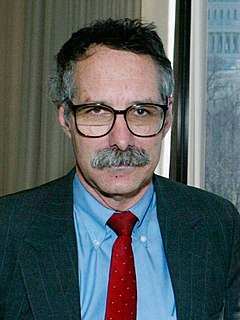Top 443 Widespread Quotes & Sayings - Page 8
Explore popular Widespread quotes.
Last updated on December 4, 2024.
It is always a great honour to mention a truth which has not become widespread yet. One of these truths is that man has no soul; he has only 'body' and 'mind'. Man's unshakable belief on the soul will not change this scientific truth! No belief can be higher than the scientific truths! Man can be born, can walk and work and can think without owning a mysterious and an immaterial soul! The soullessness of the man is a great tragedy both for the man and for the religion. But Man, contrary to the religion, will come out with triumph from this tragedy.
The basis for building a Christian society is evangelism and missions that lead to a widespread Christian revival, so that the great mass of earth's inhabitants will place themselves under Christ's protection, and then voluntarily use his covenantal laws for self-government. Christian reconstruction begins with personal conversion to Christ and self-government under God's law; then it spreads to others through revival; and only later does it bring comprehensive changes in civil law, when the vast majority of voters voluntarily agree to live under biblical blueprints.
At a meeting in her office in the late summer of 2002, months before the war in Iraq, prisoner abuse at Guantanamo is discussed. Condoleezza Rice brings in Donald Rumsfeld for a meeting, and they all agree they have to do something. Nothing gets done. Did everybody understand we were going to be as tough as we could be people we thought were Al Qaeda? Is there a better way to get information, get their trust, establish rapport, try to change their views? Nobody wants to think about that. It's just, let's beat them up. And that attitude was widespread throughout the Administration.
I think, at some level, we see young people all over the country mobilizing around different issues, in which they're doing something that I haven't seen for a long time. And that is, they're linking issues together. You can't talk about police violence without talking about the militarization of society in general. You can't talk about the assault on public education unless you talk about the way in which capitalism defunds all public goods. You can't talk about the prison system without talking about widespread racism. You can't do that. They're making those connections.
Propaganda must not concern itself with what is best in man - the highest goals humanity sets for itself, its noblest and most precious feelings. Propaganda does not aim to elevate man, but to make him serve. It must therefore utilize the most common feelings, the most widespread ideas, the crudest patterns, and in so doing place itself on a very low level with regard to what it wants man to do and to what end. Hate, hunger, and pride make better levers of propaganda than do love or impartiality.
There are no violent gangs fighting over aspirin territories. There are no violent gangs fighting over whisky territories or computer territories or anything else that's legal. There are only criminal gangs fighting over territories covering drugs, gambling, prostitution, and other victimless crimes. Making a non-violent activity a crime creates a black market, which attracts criminals and gangs, which turns what was once a relatively harmless activity affecting a small group of people into a widespread epidemic of drug use and gang warfare.
We need to build millions of little moments of caring on an individual level. Indeed, as talk of a politics of meaning becomes more widespread, many people will feel it easier to publicly acknowledge their own spiritual and ethical aspirations and will allow themselves to give more space to their highest vision in their personal interactions with others. A politics of meaning is as much about these millions of small acts as it is about any larger change. The two necessarily go hand in hand.
When anesthesia was developed, it was for many decades routinely withheld from women giving birth, since women were "supposed" to suffer. One of the few societies to take a contrary view was the Huichol tribe in Mexico. The Huichol believed that the pain of childbirth should be shared, so the mother would hold on to a string tied to her husband's testicles. With each painful contraction, she would give the string a yank so that the man could share the burden. Surely if such a mechanism were more widespread, injuries in childbirth would garner more attention.
Capital, and the question of who owns it and therefore reaps the benefit of its productiveness, is an extremely important issue that is complementary to the issue of full employment... I see these as twin pillars of our economy: Full employment of our labor resources and widespread ownership of our capital resources. Such twin pillars would go a long way in providing a firm underlying support for future economic growth that would be equitably shared.
At the present moment in our culture this yearning for meaning and consciousness, this yearning to give and serve something higher than ourselves, is breaking through the hard crust of our widespread cultural materialism and pseudo-scientific underestimation of what a human being is meant to be together with an equally tragic overestimation of what we human beings are capable of in our present everyday state of being. The intensity of the present confusion about the nature and existence of God is a symptom of this yearning within the whole of our modern culture.
After the birth of printing books became widespread. Hence everyone throughout Europe devoted himself to the study of literature... Every year, especially since 1563, the number of writings published in every field is greater than all those produced in the past thousand years. Through them there has today been created a new theology and a new jurisprudence; the Paracelsians have created medicine anew and the Copernicans have created astronomy anew. I really believe that at last the world is alive, indeed seething, and that the stimuli of these remarkable conjunctions did not act in vain.
If President Clinton has his way, we will have a false debate in the 1996 election campaign. It will not engage real political choices - choices framed by our appetite for government services and our distaste for taxes - but rather artificial choices crafted by Clinton to advance his reelection. Clinton has clearly been using the budget as an election platform...I dislike using the word 'lies,' but Clinton exploits such forbearance (widespread in the press) to spread untruths.
The poverty we see in America is now too widespread, and too complex, for easy fixes. But I do think we can reimagine many of our institutions and can create new ones in ways that would be effective. We could, for example, create social insurance systems, similar to social security, such as that we went through in 2008-9. We could create a financial transaction tax, oil profit taxes and a fairer estate tax system, and we could plow much of the revenue raised from these into job training programs, into better education infrastructure, into an expanded Earned Income Tax Credit.
A system in which legal police shootings of unarmed civilians are a common occurrence is a system that has some serious flaws. In this case, the drawback is a straightforward consequence of America's approach to firearms. A well-armed citizenry required an even-better-armed constabulary. Widespread gun ownership creates a systematic climate of fear on the part of the police. The result is a quantity of police shootings that, regardless of the facts of any particular case, is just staggeringly high. Young black men, in particular, are paying the price for America's gun culture.
There can be no doubt that the young of today have to be protected against certain poisonous effects inherent in present-day civilization. Five social diseases surround them, even in early childhood. There is the decline in fitness due to modern methods of locomotion; the decline in initiative due to the widespread disease of spectatoritis; the decline in care and skill due to the weakened tradition of craftsmanship; the decline in self-discipline due to the ever-present availability of tranquilizers and stimulants, and the decline in compassion, which William Temple called "spiritual death.
We are all pirates at heart. There is not one of us who hasn't had a little larceny in his soul. And which one of us wouldn't soar if God had thought there was merit in the idea? So, when we see one of those great widespread pirates soaring across the grain of sea winds we thrill, and we long, and, if we are honest, we curse that we must be men every day. Why not one day a bird! There's an idea, now, one day out of seven a pirate in the sky. What puny power a man can attain by comparison. Compare a 747 with a bird and blush!
Anyone who knows he is loved is in turn prompted to love. It is the Lord himself, who loved us first, who asks us to place at the center of our lives love for him and for the people he has loved. It is especially adolescents and young people, who feel within them the pressing call to love, who need to be freed from the widespread prejudice that Christianity, with its commandments and prohibitions, sets too many obstacles in the path of the joy of love and, in particular prevents people from fully enjoying the happiness that men and women find in their love for one another.
The lordship of man over man is the root cause of all corrupt rule. In the light of this principle, no laws are legitimate except God's law, and no government is legitimate except those who rule as God's deputies, implementing God's laws alone, which no-one has the power to change. So I say to you: if you really want to root out corruption now so widespread on God's earth, stand up and fight against corrupt rule; take power and use it on God's behalf. It is useless to think you change things by preaching alone.
One of the basics of a good system of innovation is diversity. In some ways, the stronger the culture (national, institutional, generational, or other), the less likely it is to harbor innovative thinking. Common and deep-seated beliefs, widespread norms, and behavior and performance standards are enemies of new ideas. Any society that prides itself on being harmonious and homogeneous is very unlikely to catalyze idiosyncratic thinking. Suppression of innovation need not be overt. It can be simply a matter of peoples walking around in tacit agreement and full comfort with the status quo.
Indeed, being a beginner is very difficult right now. Book publishers are in a crisis, sales are dwindling, and publishing houses are losing money, doing their best to survive. It's a sign of the times, the emergence of new kinds of entertainment -- there's nothing we can do about it. I don't think books will perish for good. They could become less widespread, though, falling even further behind movies and computer games. But we shouldn't be afraid of this, because books will always remain the entertainment of choice for intelligent people, of whom there are still many in this world.
Many faculty retreated into academic specializations and an arcane language that made them irrelevant to the task of defending the university as a public good, except for in some cases a very small audience. This has become more and more clear in the last few years as academics have become so insular, often unwilling or unable to defend the university as a public good, in spite of the widespread attacks on academic freedom, the role of the university as a democratic public sphere, and the increasing reduction of knowledge to a saleable commodity, and students to customers.
Our patriotic fervor was the result of the old and widespread belief in the idea of American exceptionalism, the idea that America was a new thing in history, different from other countries. Other nations had evolved one way or another, evolved from tribes from a gathering of clans, from inevitabilities of language and tradition and geography. But America was born, and born of ideas: that all men are created equal, that they have been given by God certain rights that can be taken from them by no man, and that those rights combine to create a thing called freedom.
Most people lose money because of lack of emotional discipline -the ability to keep their emotions removed from investment decisions. Dieting provides an apt analogy. Most people have the necessary knowledge to lose weight-that is they know that in order to lose weight you have to exercise and cut your intake of fats. However, despite this widespread knowledge, the vast majority of people who attempt to lose weight are unsuccessful. Why? Because they lack the emotional discipline.





















